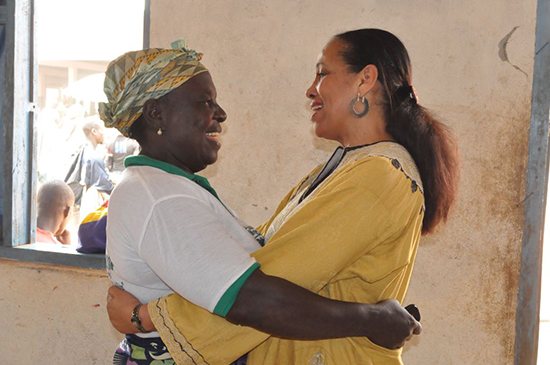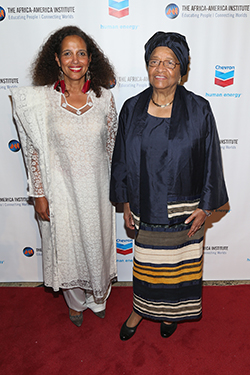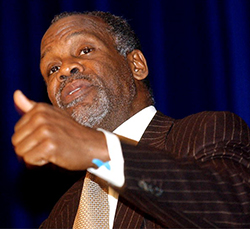Dorothy Davis helps clients support women entrepreneurs, fight disease and more.

Growing up, Dorothy Davis had a close-up look at the impact of war. It was the late 1960s, and her father, a US foreign service officer, was stationed in newly independent Nigeria during the Biafran War, a civil conflict. While visiting him during breaks from schooling in Switzerland, Davis recalls, she and her brother were chaperoned in consecutive summers by two women from opposing ethnic groups in the struggle. Listening to their experiences taught Davis (COM ’76) to see “people as people, not as sides in a conflict.” It also sparked a desire to tell stories that would give marginalized groups “a narrative and a voice.”

For more than 30 years, Davis has done that. She’s combined her communication skills and intimate knowledge of international diplomacy to help governments, organizations and companies develop and carry out their individual missions. Her work includes writing speeches, finding and managing diplomats and celebrities for advocacy work, and helping raise awareness about issues such as AIDS and women’s entrepreneurship.
Clients of her New York City–based consulting company, Dorothy Davis Inc., include the World Health Organization and the United Nations Development Programme (UNDP)—where she previously created the global Goodwill Ambassador Program. Her work has contributed to the creation of the Global Fund, which invests in programs that fight AIDS, and she cofounded a charity that supports women entrepreneurs in Liberia and that helped end the nation’s Ebola crisis.
“Global change,” says Davis, “starts with one person finding common ground with another person in order to pursue a common goal.” She learned how to find common ground with a variety of people and cultures as her family moved around the world for the foreign service. “I had to listen and be respectful of their unfamiliar cultures in order to form friendships….I later began learning that I function as the bridge and interpreter between public and private sectors, cultures and people.”
Born in Liberia, Davis had lived in five countries before arriving at COM. “I knew that my number-one love was traveling internationally. So, I chose communications in order to provide me with the flexibility to do meaningful work wherever I traveled or lived throughout my life.” After graduating, she worked for more than 10 years in radio, print and PR; in the 1980s, she says, she was the first African American ad salesperson for Fortune magazine.
A 1985 trip to Ethiopia redirected her career. Davis says she participated in a women’s delegation led by Jacqueline Jackson, Jesse Jackson’s wife, to ensure that global donations reached the country’s drought victims. Davis recalls that her international background helped her advise Jackson on many matters, such as how to prevent one delegate from offending Ethiopian officials with contentious political comments. The visit led Davis to move on from Fortune.
“When I was first asked to be a member of the delegation, I could not determine what I could contribute,” she says. “I was not a doctor. I was not rich. When I got there and saw the starving people, I realized that I had an eclectic network that did consist of doctors, rich people and other kinds of people who could help these people. I realized…I could tell their truth to wide audiences or reach out to specific people I knew for help or to bring awareness to their situations. It was much more meaningful for me to do that kind of work than to sell more advertising for Fortune.” Davis produced a documentary about her trip, A Hungry Man Knows No Politics. She says she also developed Philadelphia CAREs for Africa, an adopt-a-region program, for Mayor W. Wilson Goode.
Davis later went on to become special events officer at UNDP, where, in 1998, she helped create the framework and programming for its Goodwill Ambassador Program. Her work involved helping celebrities like actor Danny Glover and Congolese American basketball star Dikembe Mutombo advocate for poverty eradication, AIDS awareness and other issues. In 2002, she left the UNDP to become a consultant; in 2014, she founded Dorothy Davis Inc.
Success in Davis’ line of work is often hard to measure, she says, since a single speech or project “does not necessarily bring about action in terms of policy changes or more money.” Rather, it “adds to the cumulative awareness and goals of many speeches and actions across the board that contribute to consensus in a country or on a global scale.” In 2000, says Davis, Nane Annan, wife of then-UN Secretary General Kofi Annan, asked Glover to give a speech about girls and AIDS at a high-level luncheon she was hosting for spouses of heads of state and government, to garner support for UN efforts in fighting HIV/AIDS. Glover, who had lost friends to AIDS-related complications, “brought his own level of credibility as a humanitarian and visibility as a star to the situation.” Davis says the speech, which she wrote, contributed to a worldwide movement leading to the formation of the Global Fund.
Davis sees more direct impact in her work for the Sirleaf Market Women’s Fund (SMWF), a Liberia-based NGO she helped found in 2006 and whose international board she chaired from 2014 to January 2017. Davis wanted to give back to her birth country and support Liberian women with literacy education and business development training.

“I knew firsthand from Liberian family and friends how devastating the war had been on the country,” says Davis of the civil conflict that ended in 2003. “I also knew that market women”—who sell goods in open-air or covered markets—“are the backbone of Liberia’s economy.” She says the organization has built and renovated 26 markets representing 30,000 women, and provided “literacy, business, market management and health training and credit services for nearly 4,000 market women.”
When Ebola struck in 2014, Davis says, she led SMWF’s efforts to raise funds to train market women in Ebola prevention and supply markets with disinfectant. “Since the market women were change agents in bringing peace to Liberia,” she says, “we leveraged that power in them to help them become change agents in the fight against Ebola in their respective markets and communities.” SMWF has since fulfilled its goal of passing on “the ownership and vision of the organization to the market women” by evolving into a new organization, the Sustainable Market Women’s Fund, which is headed by a Liberian market woman.
None of these accomplishments might have happened if Davis had followed her original career plans. “I wanted to go straight into international journalism, but was told I would have to cover the court beat or police beat first. In short, they said it would take 20 years,” Davis says. “Given that I arrived in journalism having already grown up in the international arena, I did not understand why it would have to take so long. So, I created my own path using those same skills over and over again.”


